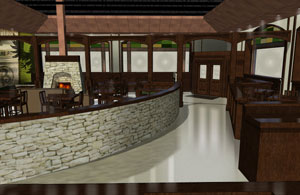Article
What's eating casual dining?
The recent sale of Applebee's isn't so much about the proliferation of fast casuals as it is increasing costs.

August 6, 2007 by Valerie Killifer — senior editor, NetWorld Alliance
Plagued by increased real estate, construction and operating costs, casual dining chains once at the top of their game are having to rework their formulas for success, thanks in part to the fast casual segment.
"Houlihan's, Bennigan's, Friday's and Applebee's, if you cover up the name it's hard to distinguish them," said Nicholas Hadgis, dean of the Widener University School of Hospitality Management. "I think they'll have to become more seasonal and look to regional products as well, and try not to be as cookie-cutter nationwide."
Hadgis attributes the problems facing casual-dining chains to the fast casual segment and its offering of healthful menu items at lower costs.
"You'll see with the purchase of Applebee's, changes in menu items and lighter fare," he said. "Even when the economy is in tough shape, people still want to go out for dinner, but you just won't go to a more expensive place."
One casual-dining concept looking to enter the fast casual market is Bennigan's. The chain plans to open its first Bennigan's Quick Grill in Dallas during the fourth quarter.
The company has been working on the concept for six to seven months, said Clay Dover, Bennigan's vice president of marketing. The restaurant will feature a condensed version of the Bennigan's menu, a smaller construction footprint (2,600 square feet) and a check average of $10 to $12.
Dover said the concept materialized in the face of real estate concerns and other industry pressures, such as increased construction and energy costs.
 |
A rendering of Bennigan's Quick Grill fast casual concept. |
"The trick, we felt, was to offer a fast casual niche that hasn't been completely blown out," Dover said. "I'm a big fast casual fan. I think casual dining still has its place, but I believe we need to be able to adapt."
One factor driving fast casual success is the consumer experience.
Dover said for restaurant patrons it's about control — of how long they linger and of how much they spend.
"Our society is going to more of a controlling society," he said. "And this is just a facet of it — I can control my dining experience. It's the cost, timing and location."
Franchise expert Dick Rennick, founder of Team Rennick and the 2005 chairman of the International Franchise Association, said fast casual popularity also comes down to customer service.
"I think it's going to take enhancing their product and enhancing their customer service," he said. "I'm not saying not think about the food, but the people coming in and 'What can we do to make your day.'"
Real estate, construction and energy
Casual dining chains hit by an increase in energy and operating costs will see little reprieve coming their way.
Tom Prakas, president and founder of Florida-based The Prakas Group, said rising fuel and operating costs will change the direction of the industry.
Restaurants will have to take up less space and will have to grow at a slower pace, he said.
"The growth is going to slow down for the some of the concepts, and strong concepts will continue to grow," he said. "Some middle concepts will have to close units or divisions, or have others come in and do some takeovers."
In regard to the Florida market, Prakas said rents are climbing faster than the inflation rate and other economy indicators, which impacts everyone's bottom line.
"There's so much overhead, and when you raise your cost and raise your expenses like that, you can't pass everything along to the consumer," he said. "Really, it's an industry problem and there may be some shakeout."
Construction costs also continue to burden the bottom line.
Rennick, who has a strong background in the construction industry, said building materials such as cement are hard to come by because of the China and Middle East markets.
"You're not seeing as many (casual dining restaurants) open in the recent past because of those costs," he said. "The ROI takes longer today than what the investor is willing to put in."
| ||||||||||||||||||||||
Real estate, construction and operating costs led Virginia Barbecue founder and president Rick Ivey to downsize plans for his restaurant chain.
Ivey said he watched large, successful chains enter airports and other smaller locations with success, prompting him to consider a smaller footprint. Additionally, the restaurant's barbecue is cooked off-site and shipped to distributors, who deliver the goods to the rest of his units. This also cuts down on overhead expenditures, he said.
But for casual dining chains looking to grow in the market, a shift will have to occur.
"Today's mindset is on people wanting to be treated like people," Rennick said. "I believe these large-scale operations, such as Chili's and Applebee's, need to change their venue and think about the people coming in."
But Ivey thinks the industry should look a little further.
"Basically, I think they need to think about smaller locations and more pick-up," he said.
Related Media
Food & BeveragePresented ByOracle
Presented ByOracle
 ChatGPT
ChatGPT Grok
Grok Perplexity
Perplexity Claude
Claude













